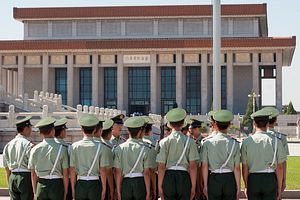On January 24, the Chinese Communist Party (CCP) Central Committee, together with the State Council, issued a document officially launching a grand campaign against organized crime across the country.
The document’s title — “Notification on carrying out a special struggle to clean up gang crime (literally, ‘black’) and eliminate evil” — is unusually grim even by China’s standards. It’s particularly worth noting that rather than referring to the campaign as an “operation,” the document adopted “struggle” — a term used mostly during the period of China’s Cultural Revolution but seldom seen after that.
The document’s tone and contents were equally serious. “The struggle is a major decision made by the Party Central Committee with Comrade Xi Jinping as the core, which concerns the stability of the overall society and the long-term peace and security of the country,” the document said. “We should maintain a tough stance against all types of organized crime.”
Particularly, the document demanded that the struggle should “combine the anti-corruption and the anti-gang crime campaign,” “hit flies at the grassroots level,” “enhance lower-level governmental organization,” and“deeply dig out” and “harshly punish” those officials who act as “protective umbrellas” for local mafia.
The notice also emphasized that “the government at every level” should put the organized crime operation on the top of their agenda as “a significant political mission.” The document calls for the government to increase the power of law enforcement. Although it forbids torture and forced confessions during investigations, human rights activists say both are common in China, especially during politically motivated cases.
At a special meeting about the struggle on the same day, Guo Shengkun, head of the Commission for Political and Legal Affairs, listed prostitution, gambling, drug trafficking, pyramid schemes, and human trafficking as priority issues.
“[We must] make great efforts to enhance the political power at the grassroots level,” Guo added.
In an attempt to show their loyalty to the CCP Central Committee, China’s local governments initiated the campaign without delay.
For example, Xiongan — a newly minted city in Hebei Province that Xi Jinping aims to make on par with Shanghai — has already issued detailed measures, demanding that each county should at least clamp down on one case of gang crime.
The latest campaign, as well as local officials’ reactions, reminded China observers of former senior CCP official Bo Xilai’s administration in Chongqing. When Bo was the top leader of Chongqing from 2007 to 2012, he also launched a big campaign “to hit gang crime and eliminate evil” across the city.
However, a large number of China analysts and Chinese legal professionals later criticized Bo for taking advantage of that campaign to purge his own political rivals. After Bo’s collapse, many people who were targeted under the campaign claimed innocence, maintaining that their cases were actually based on forced confessions rather than substantial evidence.

































